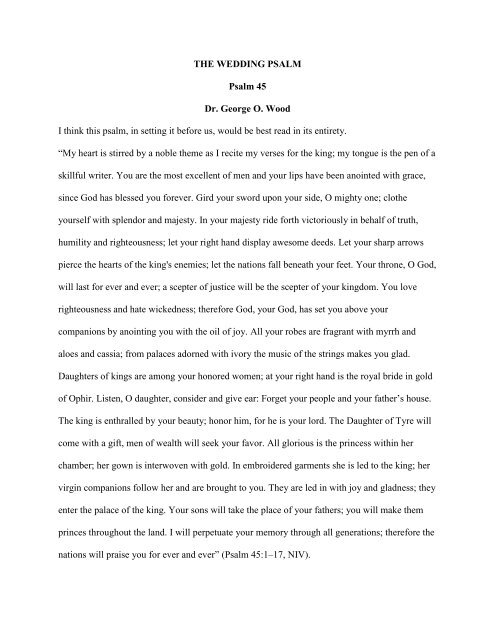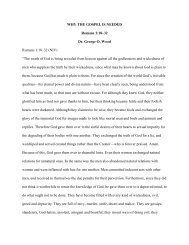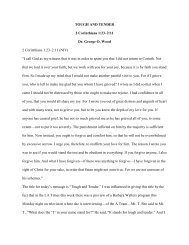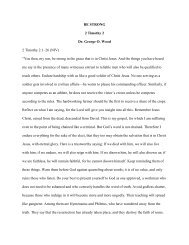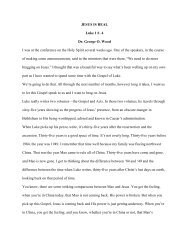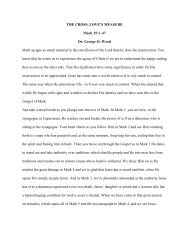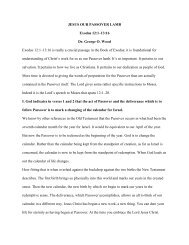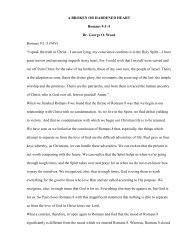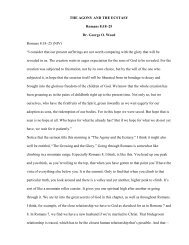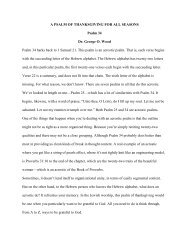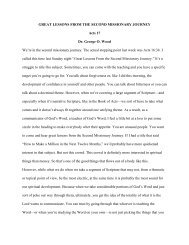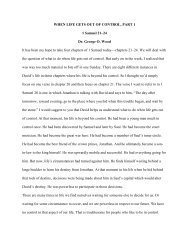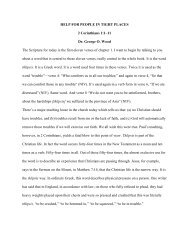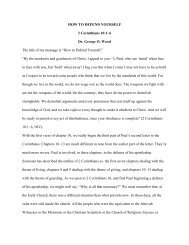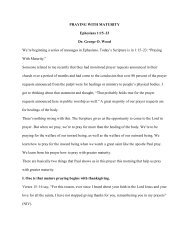36 THE WEDDING PSALM.pdf - Dr. George O. Wood
36 THE WEDDING PSALM.pdf - Dr. George O. Wood
36 THE WEDDING PSALM.pdf - Dr. George O. Wood
Create successful ePaper yourself
Turn your PDF publications into a flip-book with our unique Google optimized e-Paper software.
<strong>THE</strong> <strong>WEDDING</strong> <strong>PSALM</strong><br />
Psalm 45<br />
<strong>Dr</strong>. <strong>George</strong> O. <strong>Wood</strong><br />
I think this psalm, in setting it before us, would be best read in its entirety.<br />
―My heart is stirred by a noble theme as I recite my verses for the king; my tongue is the pen of a<br />
skillful writer. You are the most excellent of men and your lips have been anointed with grace,<br />
since God has blessed you forever. Gird your sword upon your side, O mighty one; clothe<br />
yourself with splendor and majesty. In your majesty ride forth victoriously in behalf of truth,<br />
humility and righteousness; let your right hand display awesome deeds. Let your sharp arrows<br />
pierce the hearts of the king's enemies; let the nations fall beneath your feet. Your throne, O God,<br />
will last for ever and ever; a scepter of justice will be the scepter of your kingdom. You love<br />
righteousness and hate wickedness; therefore God, your God, has set you above your<br />
companions by anointing you with the oil of joy. All your robes are fragrant with myrrh and<br />
aloes and cassia; from palaces adorned with ivory the music of the strings makes you glad.<br />
Daughters of kings are among your honored women; at your right hand is the royal bride in gold<br />
of Ophir. Listen, O daughter, consider and give ear: Forget your people and your father’s house.<br />
The king is enthralled by your beauty; honor him, for he is your lord. The Daughter of Tyre will<br />
come with a gift, men of wealth will seek your favor. All glorious is the princess within her<br />
chamber; her gown is interwoven with gold. In embroidered garments she is led to the king; her<br />
virgin companions follow her and are brought to you. They are led in with joy and gladness; they<br />
enter the palace of the king. Your sons will take the place of your fathers; you will make them<br />
princes throughout the land. I will perpetuate your memory through all generations; therefore the<br />
nations will praise you for ever and ever‖ (Psalm 45:1–17, NIV).
<strong>THE</strong> <strong>WEDDING</strong> <strong>PSALM</strong><br />
Psalm 45<br />
When I read a psalm like that, it doesn’t immediately awaken a great spiritual hotline. I<br />
recognize it immediately as great poetry. My theology says it’s inspired by the Spirit of God.<br />
There must be more there than I initially see. There’s a reason why it’s in the Bible, but probably<br />
if I were looking for some part of Scripture which would speak to some need in my life, I would<br />
not go to Psalm 45. Except maybe on a wedding day.<br />
What is this kind of psalm Is it to use once in a lifetime Is it simply a kind historical museum<br />
piece How does it relate<br />
This is one of the royal or kingly psalms in the Psalter. Out of one hundred and fifty psalms,<br />
there are thirteen of them that specifically relate to the king. The king is in the line of David. It<br />
either relates to David personally as a king or to one of David’s descendants. It is understandable<br />
that just about 10 percent of the psalms would be related to the king, since the king is the<br />
embodiment of the nation, and the prosperity of the nation in Old Testament times was directly<br />
tied to the king. Under a righteous king, the country was righteous. Under a righteous king, the<br />
country prospered. The people prospered under a fair and just administration. There was<br />
protection from both internal and external dangers. It’s not surprising that there would be great<br />
sections of the Scripture that would relate to the mission and meaning of the king. We see that<br />
today.<br />
Leadership has much to do with the direction of things. Whether it is the leadership of a country<br />
or leadership in the church. When leadership fails, it just bombs the whole body of Christ and<br />
decimates things left and right. In a certain sense, the mission of God’s people in this world is<br />
very intricately involved with leadership.<br />
Therefore, there are in the psalms moments of contemplation, moments of celebration, related to<br />
the office of king. Out of the four kingly psalms we’ve looked at before Psalm 45, the first was<br />
2
<strong>THE</strong> <strong>WEDDING</strong> <strong>PSALM</strong><br />
Psalm 45<br />
Psalm 2, which was the psalm of kingly installation. When they were going to install the king,<br />
this is the psalm you would use. The New Testament incorporates the message of Psalm 2<br />
relating it to the fact that God has installed Jesus as Messiah and King. The Lord will laugh at the<br />
puny effort of man to dethrone the King who God has placed on his throne. That’s the first and<br />
perhaps the greatest of all the kingly psalms, because it so directly ties in with the mission of<br />
Jesus.<br />
Psalm 18 was the second kingly psalm we looked at. It is a psalm which is to be used when you<br />
go through a time of victory in your life. It’s thanksgiving for victory. Probably first sung after a<br />
major victory in battle.<br />
The third kingly psalm is Psalm 20. This was a prayer before going into battle. It’s still a good<br />
prayer to use when you’re going into something stronger or bigger than you.<br />
Then the fourth kingly psalm was Psalm 21, to be used at the anniversary of the king’s reign. It is<br />
a good anniversary or birthday psalm.<br />
We’ve gone from Psalm 21 all the way to Psalm 45 before we hit the fifth of the kingly psalms.<br />
This psalm has a special limited use. That is, it was a psalm to be used on the king’s wedding<br />
day. It’s obvious that it has two meanings.<br />
It first of all had the meaning that it was related to the actual wedding of a king. There’s no clue<br />
within the psalm as to which king it was written for. Some have suggested it was the marriage of<br />
Solomon and the daughter of Pharaoh. Some have suggested Ahab and Jezebel—especially<br />
because of verse 12, the reference to the Daughter of Tyre, since Jezebel was from Phoenicia.<br />
Also, the reference to the palace of ivory. We know that Ahab had a palace that had inlayed<br />
ivory in it. Nobody knows for sure who it was. That’s the first meaning—that it was used for a<br />
kingly wedding.<br />
3
<strong>THE</strong> <strong>WEDDING</strong> <strong>PSALM</strong><br />
Psalm 45<br />
But the second meaning is that it is clear by reading the New Testament, especially Hebrews<br />
1:8–9, that the writer of Hebrews understood this to be a psalm referring to Jesus himself. There<br />
is a line, Psalm 45:6–7, which could never refer to a human king. It obviously could never refer<br />
to one Davidic king. The dynasty was to last forever and ever, but here the poet suddenly quits<br />
addressing the king as a human being and launches directly, in the midst of his talk to the king,<br />
into conversation with ―Your throne, O God‖ not ―your throne, O king.‖<br />
The writer of Hebrews picks this up and, in commenting how the Son is superior in the Old<br />
Testament to the angels, he lifts these two verses out and makes them say that of no human being<br />
or any angel did God ever say, ―Your throne is forever and ever‖ (Hebrews 1:8). This can only<br />
be a reference to the Messiah, to Christ.<br />
If this is the second meaning of the psalm, then it is fair to say that since verses 6–7 constitute<br />
the heart of the psalm, the whole of the psalm has therefore a reference to Christ, and the<br />
reference to Christ has to do with his union with his people, namely his church. If you go through<br />
Scripture, you’ll find many occasions where the analogy of the union between a husband and<br />
wife is used as a model for God’s relationship to his people. Hosea is an example. Ezekiel 16 is a<br />
lengthy chapter that deals with the model of husband and wife being related to the model of God<br />
being married to His people. Both human models in both passages have great failures in them but<br />
God doesn’t give up on His people.<br />
Then there’s the Song of Solomon, which is another model that has a first meaning and a second<br />
meaning.<br />
In the New Testament, there are passages like Ephesians 5:22–23 that liken the mystery of<br />
husband and wife to the mystery of Christ and His church. And also 2 Corinthians 11:2, where<br />
Paul says ―I am jealous for you with a godly jealousy. I promised you to one husband, to Christ,<br />
4
<strong>THE</strong> <strong>WEDDING</strong> <strong>PSALM</strong><br />
Psalm 45<br />
so that I might present you as a pure virgin to him.‖ Here Paul is clearly looking at life as the<br />
betrothal time, a time of engagement, with the marriage to be consummated when we are<br />
presented in the body to Christ in the resurrection day of triumph.<br />
If that’s the case, we take 2 Corinthians 11:2 and tie it in with Psalm 45, and we have a clear<br />
vision of what to look forward to at the Marriage Supper of the Lamb or the marriage procession<br />
of the bride, coming into heaven to be joined by the bridegroom, Christ.<br />
We’ll look at the first and second meanings as we walk through the psalm.<br />
This psalm is obviously a psalm set to music. Unfortunately, we don’t know the tune. It’s written<br />
by the Sons of Korah. It’s a teaching psalm.<br />
There are five parts to this psalm that we want to look at.<br />
I. The first part of Psalm 45 is a poetic introduction.<br />
It is verse 1. Here the poet very clearly is setting out his purpose in writing. Whereas, he will go<br />
on to describe the bridegroom and the bride and the procession and the conclusion of the<br />
marriage, here he is simply doing a background introduction of himself as a poet and writer. He’s<br />
confident, he is sure that he is writing something very important.<br />
He uses the phrase ―my heart is stirred,‖ which in Hebrew is ―my heart overflows‖ (verse 1).<br />
―It’s boiling and seething within me.‖ He’s confident with what he’s going to say and he’s<br />
skilled.<br />
Sometimes confidence in a person can put you off or put you at rest. We’re all a little bit hesitant<br />
around braggadocio people. But on the other hand, if we were getting ready to go into surgery<br />
and the surgeon said, ―I’m an excellent doctor and I have superb recommendations from those<br />
I’ve operated on,‖ that’s the doctor we want. The guy who’s confident of his skills. We don’t let<br />
preachers get away with that. If we try, we’ll come across as non-humble. It is right and proper<br />
5
<strong>THE</strong> <strong>WEDDING</strong> <strong>PSALM</strong><br />
Psalm 45<br />
that the servant of God should live in an atmosphere of humility. But for technicians and people<br />
whose scientific accuracy is needed, we don’t mind a little bit of confidence at all.<br />
This psalmist is both anointed of the Holy Spirit and a literary poet of rank. He may be the court<br />
poet of the person of seasoned rank who is confident enough to stand up in a public setting and<br />
address the king on his wedding day.<br />
That’s kind of an introduction. He’s at home, commending the quality of his writing.<br />
II. Here is a literary photograph of a wedding.<br />
You get the feeling he is at the wedding just as the king, dressed in his royal regalia, has come<br />
out the door of his palace to await the bridal procession. The king has taken his position to wait<br />
for the bride. The poet, first of all, wants to describe what he sees in the bridegroom. There are<br />
about six things that he notes.<br />
A. He is focused on the personhood of the king. He commends him for the kind of person he is<br />
(verse 2). It’s obviously, looking at him externally, you can describe what dress he’s wearing.<br />
And the psalmist will get around to doing this. He’s not concerned with the externality of the<br />
man. He’s concerned about his internality. He especially singles out the excellence in his person<br />
and the excellence of the grace with which he speaks.<br />
He’s praising the whole of the person before he looks at the person’s individual parts. When you<br />
take verse 2 and apply them to Jesus, they make immediate sense. They’re tremendous words of<br />
praise. What do we see when we first get around him The excellence of his person. Every facet<br />
scintillates with glory and splendor, so that the whole is full of excellence. When the psalmist<br />
looks at the whole, then the first part he goes to, that is especially commendatory, is his speech.<br />
We look at Jesus the same way. We first of all focus on Him and who he is. Then we’re caught<br />
with the splendor of His words—with the power of His teaching.<br />
6
<strong>THE</strong> <strong>WEDDING</strong> <strong>PSALM</strong><br />
Psalm 45<br />
B. The second thing the psalmist notes is the king’s regal attire. It is a dress uniform. The sword<br />
represents the military majesty of his office.<br />
How could the second meaning here apply to Christ Christ wore just a general garment in His<br />
life here on earth. But in Revelation 19:11–16 we see fulfillment in that day, when Christ has His<br />
revelation as king over the earth.<br />
When you look at the king’s dress, it is the dress of victory. If you are a confident person, you’re<br />
going to dress for success, so to speak. The fact that the king is so outfitted suggests he’s in the<br />
very midst of his regal might and splendor. I think there’s a comfort to this, to knowing that<br />
Christ does wear this kind of dress. We rely upon him to have the last word. It’s good to know<br />
that we have one who doesn’t simply play a role but who has the weight of authority that role<br />
calls for.<br />
C. The third thing the poet notes about the bridegroom is the quality of his reign.<br />
―Truth, humility and righteousness‖ (verse 4). This king does not ride forth as an agent of a<br />
cruel, bloody conquest as so many kings have done—victory for victory’s sake. Conquest for<br />
conquest’s sake. This king’s reign is linked to moral goodness. He rides on behalf of truth,<br />
meekness—probably a better translation than humility. Meekness involves both gentleness and<br />
strength and righteousness. In the Messiah’s reign, there is a moral quality. Not simply external<br />
power.<br />
D. The fourth thing the poet notes is the success of his reign (verse 5). I think the language and<br />
theology of that verse is picked up in the New Testament in regard to Christ. Look at 1<br />
Corinthians 15. You find that it’s said of Jesus, ―Then the end will come, when he hands over the<br />
kingdom to God the Father after he has destroyed all dominion, authority and power. For he must<br />
reign until he has put all his enemies under his feet. The last enemy to be destroyed is death‖ (1<br />
7
<strong>THE</strong> <strong>WEDDING</strong> <strong>PSALM</strong><br />
Psalm 45<br />
Corinthians 15:24–26, NIV). When you read Psalm 5 and want to have a more precise spiritual<br />
application of the verse, rather than thinking of the Lord shooting daggers into a human enemy,<br />
whom we are to forgive, I think the language of Paul in 1 Corinthians is a picture of Christ firing<br />
the mortal arrow into death itself. He spoils death and all the other enemies. He has strength to<br />
defeat His enemies. All the nations are beneath His feet. Philippians 2 picks that up as well.<br />
He admonishes us not to lose heart, because we’re on the winning side. Don’t lose heart. It’s<br />
good to read a psalm like this. The arrows are going to pierce the enemies and the Lord will be<br />
victorious, so don’t, in the midst of life’s struggle, check out. It’s not over. It’s not over until the<br />
Lord returns.<br />
E. The fifth thing noted about this king is that he has an eternal reign. ―Your throne, O God, will<br />
last forever and ever. The scepter of justice will be the scepter of your kingdom‖ (Psalm 45:6).<br />
There’s security there. In verse 7, he returns to the inner character of the king. ―You love justice<br />
and hate wickedness. Therefore God, your God, has set you above your companions by anointing<br />
you with the oil of joy‖ (Psalm 45:7).<br />
F. The next thing he notes is the charisma and magnetism of the king (verses 8–9). Here’s a king<br />
dressed in his regal bearing who smells good. Myrrh was an aromatic resin used mainly in<br />
podwer form. Aloes was a sweet smelling wood from India. Cassia was dried cinnamon blossom<br />
used for incense. The mixture formed some kind of cologne concoction that smelled great.<br />
What this is saying of the earthly king is the five senses were involved on his wedding day. Even<br />
the sense of smell communicated the picture of success and warmth and magnetism. In regard to<br />
Christ, I think it signifies the marvelous charm in His person. The king is living in palaces of<br />
ivory.<br />
8
<strong>THE</strong> <strong>WEDDING</strong> <strong>PSALM</strong><br />
Psalm 45<br />
A magnetic person who lives in splendor. Such a magnetic person will have a magnetic bride.<br />
Sure enough, in the last description we have of the king, we find it being said that he’s got a<br />
royal bride waiting for him. She’s no slouch.<br />
There’s something strange and unusual about the portrayal of the wedding as compared to a<br />
modern wedding. In a modern wedding, what is the attention upon The bridegroom or the<br />
bride The bride! It’s her day!<br />
But in this psalm, the focus is not on the bride but on the groom. Why Just because he’s the<br />
king That’s part of it. You’d expect, if it’s a kingly psalm, that the focus is on the king. But if<br />
it’s also the second meaning—Christ—it’s not surprising that the focus is upon Him rather than<br />
upon us. That’s what we have in the psalm.<br />
III. The third part of the psalm begins in verse 10. There is now counsel the poet is going to<br />
give to the bride.<br />
He is going to give two commands and one promise. Verse 10, ―Listen, O daughter. Consider<br />
and give ear. Forget your people and your father’s house…‖<br />
A. Forget the past. You’re leaving that behind. You’re coming now to the king to live in his<br />
house. Isn’t that picked up in the New Testament ―Forgetting the things which are behind‖<br />
(Philippians 3:13). ―If anybody is in Christ, he is a new creature. The old has passed away. The<br />
new has come‖ (2 Corinthians 5:17). The old is gone. Forget what you were. There’s a new<br />
identity now.<br />
B. The second command is to honor your lord. Psalm 45:11, ―The king is enthralled by your<br />
beauty. Honor him, for he is your lord.‖ This verse is a great model of marriage. It’s obvious that<br />
the wife is being called upon to respect her husband but it’s obvious, as well, that the husband is<br />
crazy about his wife. If both aren’t operating at 100 percent, it’s hard to fulfill both of those. In<br />
9
<strong>THE</strong> <strong>WEDDING</strong> <strong>PSALM</strong><br />
Psalm 45<br />
regard to the second meaning, this suggests that Christ thinks we’re of value and of beauty.<br />
When we come to Christ, He has redeemed us. He really does make something beautiful out of<br />
our life. The Lord, through His grace, somehow does that for us. He’s able to see us, not for our<br />
own beauty, but for the beauty He clothes us with.<br />
C. The third counsel that’s given as a promise is verse 12. Why is the ―Daughter of Tyre‖ used<br />
here ―Daughter‖ is probably a reference to the city of Tyre. In biblical days, it was a powerful,<br />
wealthy trading capital. If you want to get an idea of the wealth of the people, read Ezekiel 27. It<br />
gives an incredible description. It’s like NYC in terms of its ability to import or export anything<br />
in the world. It is the fashion plate of the world. Here it is a poetic allusion. Where it says<br />
―Daughter of Tyre‖ it means—when you think of rich, you use the word ―Daughter of Tyre.‖<br />
What this is promising the bride is, ―You’ve got more than a relationship.‖ That’s first and front<br />
and center. But with the relationship comes a wonderful environment. You’re going to have<br />
wealth and influence. All owed to the status that is conferred by the bridegroom.<br />
IV. The fourth part of the psalm proceeds, in verses 13–15, with the glorious process.<br />
Verses 1–12 has kind of been ―still frame‖ and we’ve been poised at the action where the king<br />
has been waiting at the door of his palace. Now the film starts! Glorious procession.<br />
I think Jesus picks up on this a little bit when He tells the story of the five foolish handmaidens<br />
and the five wise ones, who are ready for the bridegroom when He returns. Here is a bride who is<br />
obviously dressed and ready, on her wedding day, to meet the king. The bride of Christ is going<br />
to His home. We’re going to enter the palace of the king.<br />
V. The last part of the psalm—the conclusion.<br />
Here again the bride is being told to turn her eyes away from the past and toward the future. The<br />
future is not where her father is. The future is where her sons are. The promise of marriage—that<br />
10
<strong>THE</strong> <strong>WEDDING</strong> <strong>PSALM</strong><br />
Psalm 45<br />
it will lead us into a better future than was our past. It seems that every marriage is looking for<br />
two fundamental things. They’re looking for intimacy and they’re looking for security. Where<br />
there is not real intimacy and openness and sharing in their relationship, both are feeling<br />
shortchanged. Where there is not genuine security in the marriage, there is not what there needs<br />
to be.<br />
The Scriptures can so freely use the analogy of marriage to refer to Christ’s people. Those two<br />
things are present in our relationship we have with the Lord: intimacy and security. The psalm<br />
closes on that kind of note—leading us in the security that we enjoy with the Lord in His palace.<br />
Closing Prayer<br />
Thank You, Lord, for Your Word. Thank You for the fellowship we have with You. Not the<br />
fellowship of someone at arm’s distance. Or even at handshake link. But the friendship of<br />
intimacy with You. Nothing about us is hidden with You. Thank You for bringing us into Your<br />
presence. Thank You for the security that You offer us when we’re weak, when we’re tossed,<br />
when we’re bruised and needy. You’re there. You’re always there. Your covenant with us is<br />
renewed. Your faithfulness is renewed every morning. You have a glorious future ahead for us.<br />
People of such a great future are people with a great present. Thank You, Lord, for the present<br />
moment of life You’ve called us to. Help us to follow You with joy, while strengthening our<br />
hearts. Through Christ our Lord. Amen.<br />
11


